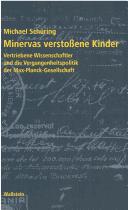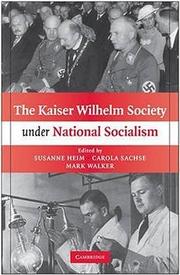| Listing 1 - 10 of 12 | << page >> |
Sort by
|
Periodical
Year: 2000 Publisher: München : Max-Planck-Gesellschaft zur Förderung der Wissenschaften,
Abstract | Keywords | Export | Availability | Bookmark
 Loading...
Loading...Choose an application
- Reference Manager
- EndNote
- RefWorks (Direct export to RefWorks)
Periodical
Year: 2000 Publisher: München : Max-Planck-Gesellschaft zur Förderung der Wissenschaften,
Abstract | Keywords | Export | Availability | Bookmark
 Loading...
Loading...Choose an application
- Reference Manager
- EndNote
- RefWorks (Direct export to RefWorks)
Book
ISBN: 3428090683 Year: 1998 Publisher: Berlin Duncker und Humblot
Abstract | Keywords | Export | Availability | Bookmark
 Loading...
Loading...Choose an application
- Reference Manager
- EndNote
- RefWorks (Direct export to RefWorks)
Scientists --- Portraits --- Max-Planck-Gesellschaft zur Förderung der Wissenschaften --- History.
Periodical
Year: 2000 Publisher: München : Max-Planck-Gesellschaft zur Förderung der Wissenschaften,
Abstract | Keywords | Export | Availability | Bookmark
 Loading...
Loading...Choose an application
- Reference Manager
- EndNote
- RefWorks (Direct export to RefWorks)
Book
ISBN: 9004529136 9004449752 Year: 2023 Publisher: Leiden, The Netherlands : Koninklijke Brill NV,
Abstract | Keywords | Export | Availability | Bookmark
 Loading...
Loading...Choose an application
- Reference Manager
- EndNote
- RefWorks (Direct export to RefWorks)
This book provides the first comprehensive historical account of the evolution of scientific traditions in astronomy, astrophysics, and the space sciences within the Max Planck Society. Structured with in-depth archival research, interviews with protagonists, unpublished photographs, and an extensive bibliography, it follows a unique history: from the post-war relaunch of physical sciences in West Germany, to the spectacular developments and successes of cosmic sciences in the second half of the 20th century, up to the emergence of multi-messenger astronomy. It reveals how the Society acquired national and international acclaim in becoming one of the world’s most productive research organizations in these fields.
History. --- Modern History. --- History of Science. --- Modern history --- World history, Modern --- World history --- Max-Planck-Gesellschaft zur Förderung der Wissenschaften --- M.P.G. --- Max Planck Association --- Max-Planck-Gesellschaft --- Max-Planck-Gesellschaft zur Förderung der Wissenschaften. --- Max Planck Society --- Max Planck Society for the Advancement of Science --- MPG --- Kaiser Wilhelm-Gesellschaft zur Förderung der Wissenschaften --- Astrophysics --- Science --- Max-Planck-Gesellschaft zur Fo¨rderung der Wissenschaften

ISBN: 3892448795 Year: 2006 Publisher: Göttingen Wallstein
Abstract | Keywords | Export | Availability | Bookmark
 Loading...
Loading...Choose an application
- Reference Manager
- EndNote
- RefWorks (Direct export to RefWorks)
Brain drain --- National socialism and science --- Restitution and indemnification claims (1933- ) --- Return migration --- History --- History --- History --- Max-Planck-Gesellschaft zur Förderung der Wissenschaften --- History.
Book
ISBN: 3666993710 Year: 2022 Publisher: Göttingen : Vandenhoeck & Ruprecht,
Abstract | Keywords | Export | Availability | Bookmark
 Loading...
Loading...Choose an application
- Reference Manager
- EndNote
- RefWorks (Direct export to RefWorks)
Der Band versammelt Beitrage zu den sechs fruhen juristischen Max-Planck-Instituten und der Herausbildung eines rechtswissenschaftlichen Schwerpunkts in der Max-Planck-Gesellschaft. Mit der Ubernahme der fruheren Kaiser-Wilhelm-Institute fur Volkerrecht und Internationales Privatrecht sollte die Rechtswissenschaft eine wichtige Rolle in der Herausbildung einer geisteswissenschaftlichen Sektion der MPG spielen. Ein entscheidender Schritt war die Grundung bzw. Aufnahme gleich drei neuer Institute in den 1960er Jahren. Seitdem sind die juristischen Max-Planck-Institute aus der MPG nicht mehr wegzudenken. Sie sind fur die deutsche und internationale Rechtswissenschaft eine feste Grosse geworden. Die Beitrage beleuchten Entstehung und Entwicklung dieser Institute im Kontext ihrer jeweiligen Fachrichtung und Bedeutung fur die Wissenschaftsgeschichte des Rechts.
Book
ISBN: 1283429985 9786613429988 311023954X 3110239531 Year: 2011 Publisher: Berlin ; Boston : De Gruyter,
Abstract | Keywords | Export | Availability | Bookmark
 Loading...
Loading...Choose an application
- Reference Manager
- EndNote
- RefWorks (Direct export to RefWorks)
This volume, occasioned by the centenary of the Fritz Haber Institute, formerly the Institute for Physical Chemistry and Electrochemistry, covers the institute's scientific and institutional history from its founding until the present. The institute was among the earliest established by the Kaiser Wilhelm Society, and its inauguration was one of the first steps in the development of Berlin-Dahlem into a center for scientific research. Its establishment was made possible by an endowment from Leopold Koppel, granted on the condition that Fritz Haber, well-known for his discovery of a method to synthesize ammonia from its elements, be made its director. The history of the institute has largely paralleled that of 20th-century Germany. It undertook controversial weapons research during World War I, followed by a "Golden Era" during the 1920's, in spite of financial hardships. Under the National Socialists it experienced a purge of its scientific staff and a diversion of its research into the service of the new regime, accompanied by a breakdown in its international relations. In the immediate aftermath of World War II it suffered crippling material losses, from which it recovered slowly in the post-war era. In 1953, shortly after taking the name of its founding director, the institute joined the fledgling Max Planck Society. During the 1950's and 60's, the institute supported diverse researches into the structure of matter and electron microscopy in a territorially insular and politically precarious West-Berlin. In subsequent decades, as both Berlin and the Max Planck Society underwent significant changes, the institute reorganized around a board of coequal scientific directors and a renewed focus on the investigation of elementary processes on surfaces and interfaces, topics of research that had been central to the work of Fritz Haber and the first "Golden Era" of the institute.
Electrochemistry - Research - Germany - History. --- Electrochemistry -- Research -- Germany -- History. --- Haber, Fritz. --- Haber, Fritz, 1868-1934. --- Max-Planck-Gesellschaft zur F'orderung der Wissenschaften. --- Max-Planck-Gesellschaft zur Förderung der Wissenschaften. Fritz-Haber-Institut. --- Physics - Research - Germany - History. --- Physics -- Research -- Germany -- History. --- Electrochemistry --- Physics --- Chemistry --- Physical Sciences & Mathematics --- Physical & Theoretical Chemistry --- Research --- History --- History. --- Haber, Fritz, --- Max-Planck-Gesellschaft zur Förderung der Wissenschaften. --- Natural philosophy --- Philosophy, Natural --- Haber, F. --- Fritz-Haber-Institut der Max-Planck-Gesellschaft --- Fritz Haber Institute of the Max Planck Society --- Physical sciences --- Dynamics --- Chemistry, Physical and theoretical --- History of Chemistry. --- Physical Chemistry. --- Max-Planck-Gesellschaft zur Forderung der Wissenschaften.

ISBN: 9780511576355 9780521879064 9780521181549 0511576358 9780511534331 0511534337 052187906X 9780521879 9789780521875 0521181542 1107199298 1283331098 0511534027 9786613331090 0511532628 0511531710 0511533535 Year: 2009 Publisher: New York, NY Cambridge University Press
Abstract | Keywords | Export | Availability | Bookmark
 Loading...
Loading...Choose an application
- Reference Manager
- EndNote
- RefWorks (Direct export to RefWorks)
During the first part of the twentieth century, German science led the world. The most important scientific institution in Germany was the Kaiser Wilhelm Society, including institutes devoted to different fields of scientific research. These researchers were not burdened by teaching obligations and enjoyed excellent financial and material support. When the National Socialists came to power in Germany, all of German society, including science, was affected. The picture that previously dominated our understanding of science under National Socialism from the end of the Second World War to the recent past - a picture of leading Nazis ignorant and unappreciative of modern science and of scientists struggling to resist the Nazis - needs to be revised. This book surveys the history of Kaiser Wilhelm Institutes under Hitler, illustrating definitively the cooperation, if not collaboration, between scientists and National Socialists in order to further the goals of autarky, racial hygiene, war, and genocide.
Science and state --- National socialism and science --- Science and national socialism --- Science --- Science policy --- State and science --- State, The --- History. --- Government policy --- Kaiser Wilhelm-Gesellschaft zur Förderung der Wissenschaften. --- Kaizā Uiruherumu Gakujutsu Shinkō Kyōkai --- Kaiser-Wilhelm-Gesellschaft --- Kaizā Viruherumu Kagaku Shinkō Kyōkai --- Kaiser-Wilhelm Institute --- Kaiser Wilhelm Society --- KWG --- K.W.G. --- KWS --- K.W.S. --- Max-Planck-Gesellschaft zur Förderung der Wissenschaften --- Arts and Humanities --- History --- Kaiser Wilhelm-Gesellschaft zur Forderung der Wissenschaften.
Book
ISBN: 1281250694 9786611250690 1402067186 1402067178 Year: 2008 Volume: 260 Publisher: New York, N.Y. : Springer Berlin Heidelberg,
Abstract | Keywords | Export | Availability | Bookmark
 Loading...
Loading...Choose an application
- Reference Manager
- EndNote
- RefWorks (Direct export to RefWorks)
The book offers a history of the agricultural sciences in Nazi Germany. It analyzes scientific practice under the Nazi regime, Nazi agricultural policy and autarkic strategies as well as expansion policy in Eastern Europe. It also offers new insights into the Auschwitz concentration camp. It outlines the Nazi’s comprehensive nutritional and agricultural research program intended to prepare Germany for war by raising productivity through scientific means, researching the relation between nutrition and performance at the edge of starvation, and restructuring the agricultural economy of the continent. The book reveals the relation between science and power in Nazi Germany beyond the usual dichotomy that paints scientists in Nazi Germany either as victims of oppression or as sadistic beasts. It shows the involvement of a high ranking scientific elite in the Nazi regime of occupation and looting of cultural goods in the occupied eastern territories – largely for the sake of their own careers. The main audience the book addresses are students of history and the history of science, and anyone interested in the history of Nazi Germany.
Plant breeding --- Animal breeding --- Agriculture --- Science and state --- National socialism and science. --- Research --- History. --- History --- Kaiser Wilhelm-Gesellschaft zur Förderung der Wissenschaften. --- Kaizā Uiruherumu Gakujutsu Shinkō Kyōkai --- Kaiser-Wilhelm-Gesellschaft --- Kaizā Viruherumu Kagaku Shinkō Kyōkai --- Kaiser-Wilhelm Institute --- Kaiser Wilhelm Society --- KWG --- K.W.G. --- KWS --- K.W.S. --- Max-Planck-Gesellschaft zur Förderung der Wissenschaften --- Science and national socialism --- Science --- Farming --- Husbandry --- Industrial arts --- Life sciences --- Food supply --- Land use, Rural --- Domestic animals --- Breeding --- Crops --- Agricultural economics. --- Agriculture. --- Plant genetics. --- Animal physiology. --- History of Science. --- Agricultural Economics. --- History, general. --- Plant Genetics and Genomics. --- Animal Physiology. --- Animal physiology --- Animals --- Biology --- Anatomy --- Plants --- Genetics --- Agrarian question --- Agribusiness --- Agricultural economics --- Agricultural production economics --- Production economics, Agricultural --- Annals --- Auxiliary sciences of history --- Physiology --- Economic aspects --- Kaiser Wilhelm-Gesellschaft zur Forderung der Wissenschaften.
| Listing 1 - 10 of 12 | << page >> |
Sort by
|

 Search
Search Feedback
Feedback About UniCat
About UniCat  Help
Help News
News